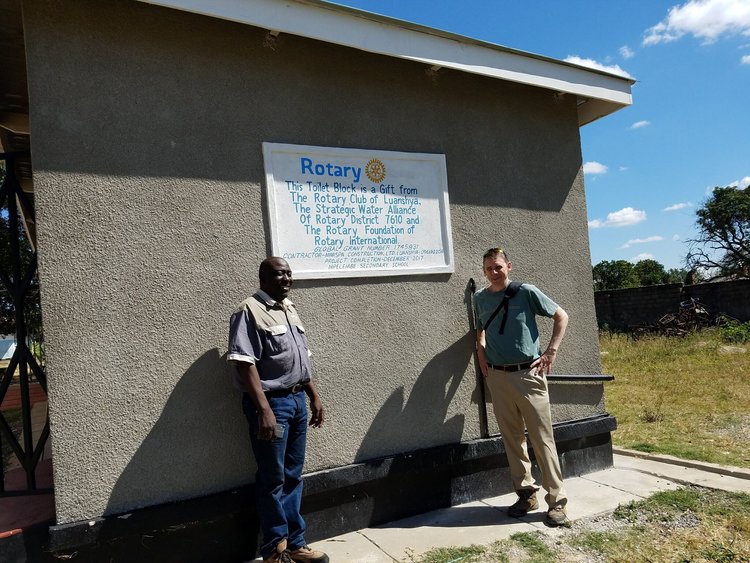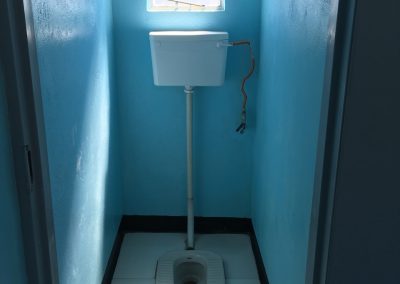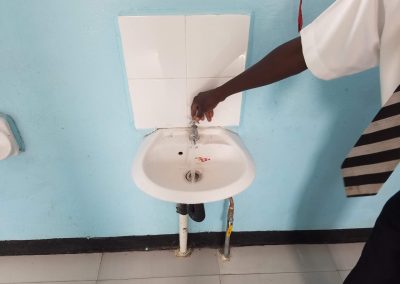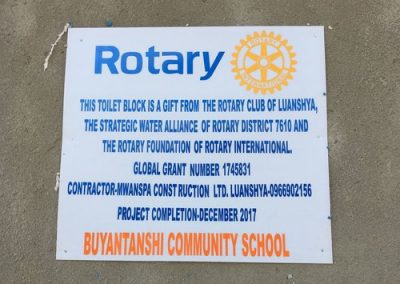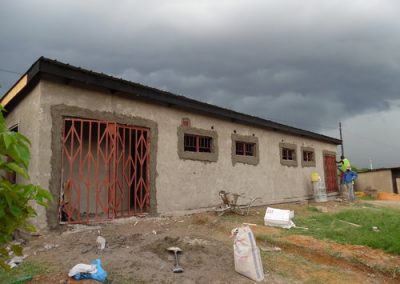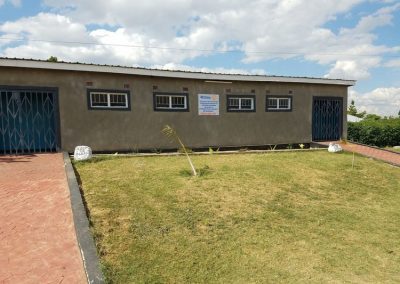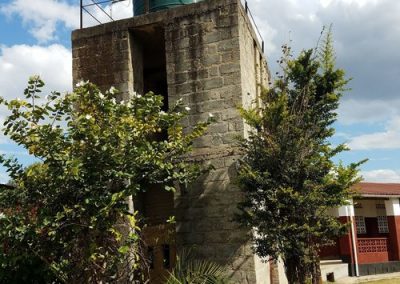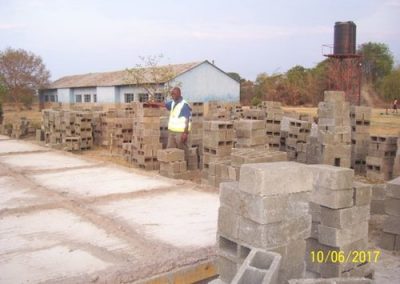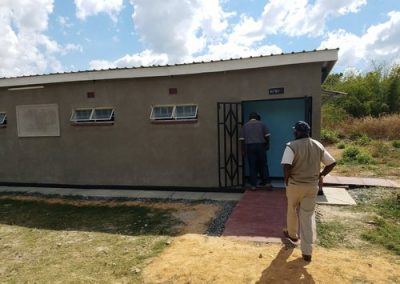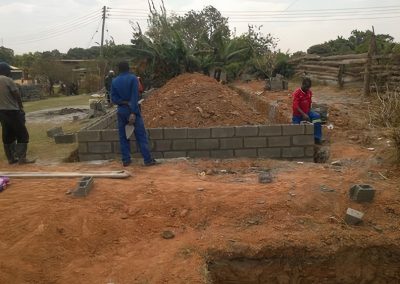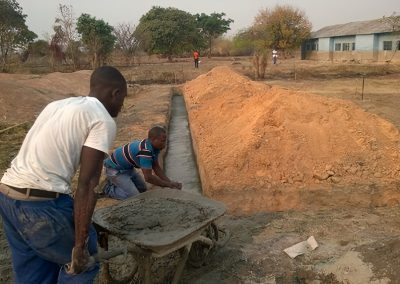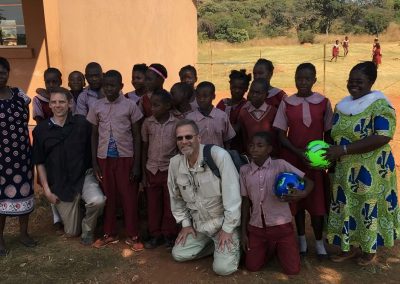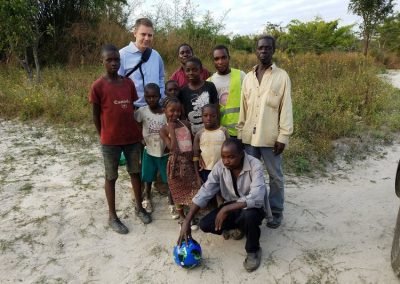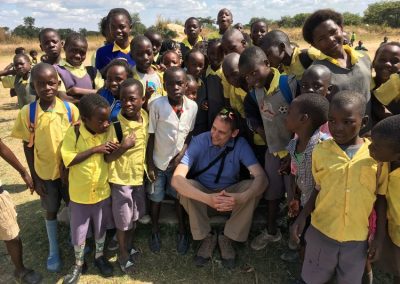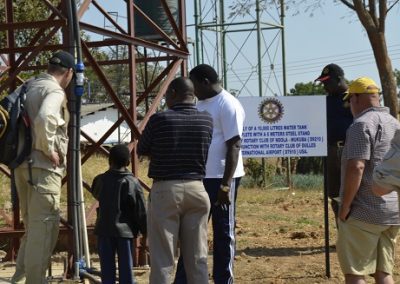Grant with Zambia Continued a Long-Term Commitment
15 clubs partner in Strategic Water Alliance using “Annual Fund Exchange”
By Bob Jansen, RC McLean VA, and Co-Chair D7610 Strategic Water Alliance
Just last month, we received word from The Rotary Foundation that our Global Grant 1745831 had received final report approval and is now considered successfully closed. GG 1745831 was another collaboration between D7610’s Strategic Water Alliance (SWA) and the Rotary Club of Luanshya, Zambia. SWA has been partnering with two Rotary Clubs in the Copperbelt region of northern Zambia (Luanshya and Ndola-Mukuba) for the past 12 years, completing water and sanitation projects in rural and semi-urban schools.
This latest grant consisted of building a tower stand for a water tank, rehabilitating ablution block toilet buildings, and constructing new waterborne ablution block toilet buildings, all benefiting four schools in the Copperbelt region. The Host Club for this work was Luanshya and the International Club representing SWA was McLean, VA. SWA is a consortium of 15 clubs in D7610 dedicated to providing clean water and proper sanitation facilities to schools and communities in need.
Over the past 12 years, SWA and our Zambian partner Rotarians have completed 39 water and sanitation projects totally approximately US $350,000. This collaboration began in 2006 when RC Dulles International Airport sank one borehole in a community. Over time, more clubs joined Dulles to tackle larger projects. At first, multiple well projects were undertaken at multiple school sites. Then latrines were added to the wells as Rotary realized one must have a sanitation component to every water project. Later, around 2013, we began installing submersible pumps in the wells so that water could be pumped to an elevated tank stand and tank. This enabled a school to provide running water for a full school day. And this latest grant has introduced waterborne ablution block toilet buildings, which consist of waterborne toilets, sinks for hand washing, and even showers. Most all of this work has been funded by Rotary’s original matching grant program and today’s current global grant program. SWA and our Zambian Rotarian partners secured a series of matching grants totaling US $170,950 from 2006 through 2012 and two global grants (US $87,210 and $92,200) from 2013 through 2018.
This latest global grant focused on sanitation projects. Mpelembe High School in downtown Luanshya is a large school which has been serving Luanshya for years. The school has a student population of 1,300, a faculty of 76, and covers grades 6-12. Our grant rehabilitated old, run-down ablution block toilet buildings and constructed new ablution block buildings to keep up with the growing school population. These ablution block systems were running water from an existing tank and bore drain to both a septic tank and drain field system. Our grant also constructed a tank stand for an additional future water tank which will be provided by another grant. In a due diligence trip this past May, we were able to confirm that students are receiving education on the importance of clean water and proper hygiene practices through their Science and Home Economics courses. Also, the school collects approximately 900 ZK or US $90 per year from each family attending the school for maintenance of the new facilities provided.
At Dag Hammarskjöld and Buyantanshi Schools, our grant provided for construction of ablution block waterborne toilet buildings. Both schools had an existing elevated tank and tower system which could serve these new buildings. As was the case at Mpelembe, each building drains to a septic tank and drain field system. Dag Hammarskjöld and Buyantanshi have student populations of approximately 450 and 400, respectively, and cover grades 1-7. We were able to confirm that students are receiving proper education on clean water and proper hygiene. Also, the school PTAs collect approximately 300 ZK or US $30 per year per family to cover maintenance and repairs.
And lastly, Maposa School received an ablution block toilet system. This system complemented a borehole constructed by SWA back in 2010-2011. The school does not have electricity so water is not yet hooked up to the ablution block building. As such, the building is currently acting as a pit latrine type toilet. The building has been constructed to convert to a waterborne toilet building once the school receives electricity, and water can be connected from the well to the toilet building. Maposa is another larger school serving approximately 620 students covering grades 1-8. Students receive water and hygiene education but being a rural school, the PTA is only able to collect approximately 42 ZK or US $4 per year per student for maintenance and repairs.
This latest global grant was funded by the “Annual Fund Exchange” method, commonly used in D7610. Each of the 15 participating D7610 clubs from SWA contributed $950 to the TRF Annual Fund above and beyond the club’s Annual Fund goal. Hence, the total additional contribution from the 15 clubs to the Annual Fund was $14,250. (These contributions do NOT show on the grant funding page since they went to the Annual Fund instead.) In exchange for this increased AF contribution by clubs, D7610 substantially increased its DDF grant contribution to $34,500—the “Annual Fund Exchange”—taking advantage of the higher World Fund match for DDF. Then, cash contributions to the grant from partner clubs Luanshya and McLean, together with a $10,000 DDF contribution from Host D9210, justified a total World Fund match in excess of $45,500 and a total grant award of $92,200. The beauties of this method are that a larger World Fund match was justified because DDF was substituted for club cash, the increased AF contributions will result in increased DDF to the district three years downstream, and each contribution from the 15 participating clubs in SWA essentially got matched almost 100 times! Rotary’s global grant funding method also speaks to the power of our Rotary Foundation. I’ve always felt that if every Rotarian truly understood this, all would become Paul Harris Society Members.
D7610’s SWA is proud of its partnership with our fellow Rotarians in Zambia and we are constantly looking for new opportunities to partner with them. And we remain committed to seek long-term sustainable solutions to the world’s water and sanitation challenges wherever they may exist. If you wish to learn more about SWA, please visit our web site www.swa7610.com or contact me at robertjansen@swa7610.org

